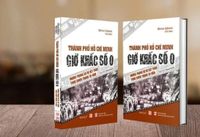A new book titled "Ho Chi Minh City - Moment Zero - Reports on the End of the 30-Year War" offers a vivid and emotional chronicle of the moment when the Vietnam War came to a close. April 30, 1975, at 11:30 AM, marked a pivotal moment that changed the fate of an entire nation, signaling the end of a conflict that lasted three decades and ushering in a new era of national independence and reunification.
For war correspondents, this moment represented the conclusion of one of the most vibrant periods of their careers, filled with lessons and reflections on the world. The book, organized by German journalist Börries Gallasch, compiles reports from various journalists who were present during those historic days. The collection includes 16 articles from authors of diverse nationalities, each contributing their unique perspectives and insights into the events that unfolded.
The journalists who witnessed the chaos of the U.S.-organized evacuation from Saigon described it as a scene of devastation, with helicopters leaving the city in droves. However, just a week later, the same correspondents observed a transformed Saigon: calm, orderly, and brimming with symbols of a new era. They noted how the atmosphere shifted dramatically in just a short time.
One striking aspect of the book is how it captures the interactions between the Liberation Army soldiers, clad in green uniforms and Ho Chi Minh rubber sandals, and the local populace. These soldiers were seen engaging openly with the people, embodying the spirit of Vietnamese unification and a belief in victory. The book also highlights the poignant moments of reunion, with students in white ao dai and families embracing and crying together, celebrating their long-awaited reunification after years of separation.
As the initial worries subsided, the people of Saigon gradually returned to their daily routines, fully aware of the challenges that lay ahead in rebuilding their country. The narrative reflects a deeper truth: the victory of Vietnam was not merely a triumph of ideology or military might, but rather a collective victory for a nation that had endured significant loss, division, and suffering to reclaim its independence and freedom.
Freimut Duve, another journalist featured in the book, remarked in the introduction that Saigon fell without significant fighting and almost no casualties. He noted that Gallasch had encouraged his colleagues to report from their subjective perspectives, capturing the emotional weight of the moment. This approach allowed for a rich tapestry of experiences and reflections that resonate with readers.
The book serves as a poignant reminder of the human cost of war and the resilience of a nation that has emerged from the shadows of conflict. The moment of reuniting with parents and siblings after years apart has become a powerful symbol of peace and national reunification. It encapsulates the joy and hope that followed the end of the war, even amid the daunting task of rebuilding a fractured society.
Through the personal stories and experiences shared in the book, readers gain insight into the broader narrative of Vietnam's history. The transformation of the nation, marked by both pain and joy, is vividly illustrated through the eyes of those who lived through it. The book is not just a chronicle of events; it is a testament to the enduring spirit of the Vietnamese people.
As the country continues to navigate its path forward, the reflections captured in "Ho Chi Minh City - Moment Zero" remind us of the importance of understanding history and the lessons it imparts. The voices of the journalists, who bore witness to this significant moment, contribute to a richer understanding of Vietnam's journey toward peace and unity.
In a world that often forgets the lessons of the past, this book stands as a vital reminder of the sacrifices made and the resilience demonstrated by a nation in the face of adversity. It is a call to remember the stories of those who lived through the war and to honor their experiences as part of the collective memory of Vietnam's struggle for independence.
As readers delve into the pages of this compelling work, they are invited to reflect on the complexities of war, peace, and the human experience. The book not only chronicles a historical event but also serves as a bridge to understanding the ongoing journey of a people determined to build a better future.


